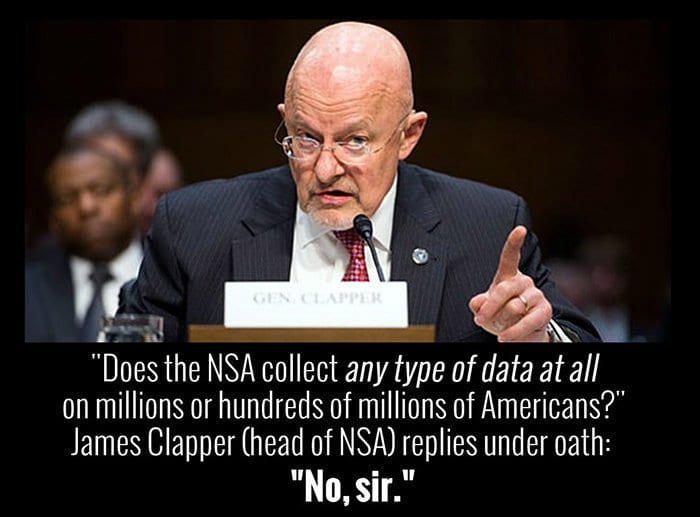Rand Paul hasn’t always been 100% on the Trump Train, but I do believe he’s a great member of the Freedom and Liberty movement and for that I appreciate him.
And I believe the more he sees and the more Trump exposes, the more that Rand Paul and President Trump will become closer friends and allies.
More signs of that happening were on display today when Rand Paul directly called out one of the Deepest and Swampiest members of the Swamp, James Clapper himself.
Rand really let it fly, calling Clapper an “admitted liar” and putting him on notice that Rand wanted to have hearings!
Folks, Clapper has previously been nearly untouchable.
The most classic example of a “made guy” in the Swamp, protected by all the other Swamp Things.
But is that protection starting to crack?
I suspect Rand Paul doesn’t publicly target Clapper unless he feels the cloak of protection may be lifting.
Here’s what Rand tweeted:
The Senate should investigate FBI methods and selective prosecution of Trump officials. TIME FOR HEARINGS!
Justice is supposed to be blind. Why is it that an admitted liar like James Clapper perjured himself to Congress and got off scot-free? But if you're somehow associated with @realDonaldTrump, then they will pursue you relentlessly? This shouldn't be a one-way street!
But to truly understand the power of these statements, we have to back up a little bit and look at what Rand is talking about.
Here's a USA Today Opinion piece that lays it out really well:
Former National Intelligence Director James Clapper is about celebrate one of the most important anniversaries of his life. March 13th will be the fifth anniversary of his commission of open perjury before the Senate Intelligence Committee. More importantly, it also happens to be when the statute of limitationsruns out — closing any possibility of prosecution for Clapper. As the clock runs out on the Clapper prosecution, Democrats like Sen. Cory Booker (D-N.J.) have charged that Homeland Security Secretary Kirstjen Nielsen committed perjury when she insisted that she could not recall if President Donald Trump called Haiti and African countries a vulgar term. The fact is that perjury is not simply tolerated, it is rewarded, in Washington. In a city of made men and women, nothing says loyalty quite as much as lying under oath.
Even in a city with a notoriously fluid notion of truth, Clapper’s false testimony was a standout. Clapper appeared before the Senate to discuss surveillance programs in the midst of a controversy over warrantless surveillance of the American public. He was asked directly, “Does the NSA collect any type of data at all on millions, or hundreds of millions of Americans?” There was no ambiguity or confusion and Clapper responded, “No, sir. … Not wittingly.” That was a lie and Clapper knew it when he said it.
Later, Clapper said that his testimony was “the least untruthful” statement he could make. That would still make it a lie of course but Clapper is a made guy. While feigned shock and disgust, most Democratic leaders notably did not call for his prosecution. Soon Clapper was back testifying and former president Obama even put Clapper on a federal panel to review the very programs that he lied about in Congress. Clapper is now regularly appearing on cable shows which, for example, used Clapper’s word as proof that Trump was lying in saying that there was surveillance of Trump Tower carried out by President Barack Obama. CNN and other networks used Clapper’s assurance without ever mentioning that he previously lied about surveillance programs.
The expiration of the statute of limitations for Clapper will have the benefit of conclusively establishing that some people in this city are above the law. In a 2007 study, author P.J. Meitl found that “[a]lmost no one is prosecuted for lying to Congress.” Indeed, he found only six people convicted of perjury or related charges in relation to Congress, going back to the 1940s.
The problem is not that the perjury statute is never enforced. Rather it is enforced against people without allies in government. Thus, Roger Clemens was prosecuted for untrue statements before Congress. He was not given the option of giving the “least untruthful” answer.
Another reason for the lack of prosecutions is that the perjury process is effectively rigged to protect officials accused of perjury or contempt before Congress. When an official like Clapper or Nielsen is accused of lying to Congress, Congress first has to refer a case to federal prosecutors and then the administration makes the decision whether to prosecute its own officials for contempt or perjury. The result has almost uniformly been “declinations” to even submit such cases to a grand jury. Thus, when both Republicans and Democrats accused CIA officials of lying to Congress about the torture program implemented under former president George W. Bush, not a single indictment was issued.
ABC News has also confirmed the blatant lies from Clapper to Congress:
America’s top intelligence official said that while he “made a mistake” when describing the National Security Agency’s domestic surveillance programs to a Senate committee, he maintains that he “did not lie.”
James Clapper, Director of National Intelligence, participated in a live Q&A through Tumblr earlier todayin which he fielded several questions from Tumblr users. While some of them were silly (he said the Intelligence Community has “high confidence” the earth is round, sorry, B.o.B), one in particular was blunt: “Why did you lie about NSA surveillance in front of Congress?”
The questioner was presumably referring to a March 2013 public hearing in which Sen. Ron Wyden, D-Ore., asked Clapper, “Does the NSA collect any type of data at all on millions, or hundreds of millions, of Americans?”
At the time, Clapper responded, “No, sir… Not wittingly. There are cases where they could inadvertently, perhaps, collect. But not wittingly.”
Later, however, it was revealed that the NSA did conduct bulk collection of metadata Americans’ communications, permissible under the controversial Section 215 of the Patriot Act.
Clapper has apologized for the "clearly erroneous" testimony before, but said today several people had asked for an explanation during the Q&A so he responded that he simply didn’t think of that particular provision about the metadata during the hearing. Rather, he assumed Wyden meant the collection of the actual content of Americans’ communications. He and Wyden, Clapper said, were not on the same “page.” Even if they were, Clapper said, the metadata program was classified at the time, which means he would not have been able to answer the question properly in a public forum.
“So, yes, I made a mistake. But I did not lie. There’s a big difference,” Clapper said today.
Following the Q&A, Sen. Wyden took issue with Clapper’s response, tweeting that he had sent Clapper the question ahead of the 2013 hearing and that he “asked [Clapper] to correct the record afterwards [and] he refused.” An attorney for the office of the director of National Intelligence told The New York Times in 2014 that while Widen's staff did provide the question a day ahead of time, Clapper had not personally seen it.
And one more, from the Washington Examiner:
Some lawmakers would like the Justice Department to prosecute former spy chief James Clapper for inaccurate testimony to Congress about domestic surveillance before it's too late.
Privacy-conscious critics say looming five-year statutes of limitations for perjury and making false statements — establishing a March 12 deadline for charges — make an urgent case for action, and that nonprosecution would set a dangerous precedent that impedes oversight and executive-branch accountability.
Clapper, director of national intelligence from 2010 to 2017, testified during a March 2013 Senate Intelligence Committee hearing that the NSA was "not wittingly” collecting “any type of data at all” on millions of Americans. Months later, former NSA contractor Edward Snowden revealedsecret court orders forced phone companies to turn over all U.S. call records on an “ongoing, daily basis.”
In an apology letter, Clapper wrote that he gave a “clearly erroneous” answer because he “simply didn’t think of” the call-record collection. But in an MSNBC interview he offered a different explanation, saying he gave the “least untruthful” answer because he was “asked a, ‘When are you going to stop beating your wife?’ kind of question, meaning not answerable necessarily by a simple yes or no.”
Lawmakers from both parties, but primarily Republicans supportive of new limits on surveillance, called for Clapper's prosecution during the Obama administration, without success. Several renewed their calls as the deadline nears.
"The time for the Department of Justice and the FBI to bring the accusations against James Clapper in front of a grand jury is long overdue,” said Rep. Ted Poe, R-Texas. “He and others who have held administrative power must be held accountable to the same laws that govern the people of the United States."
“Yes, he should be prosecuted," said Rep. Thomas Massie, R-Ky. "He admitted to lying to Congress and was unremorseful and flippant about it. The integrity of our federal government is at stake because his behavior sets the standard for the entire intelligence community. The same goes for James Comey, who secretly leaked documents that he was not legally permitted to release."
Rep. Louie Gohmert, R-Texas, meanwhile, said Clapper “should be prosecuted for any and all lies he told to Congress.”
Rep. James Sensenbrenner, R-Wis., who warned then-Attorney General Eric Holder that nonprosecution would make new limits on mass surveillance pointless because “officials are at liberty to lie about enforcing [the law]," also renewed his call for charges.
"Complete and truthful testimony is imperative for Congress to conduct effective oversight. It is clear from the evidence and Director Clapper’s own admission that he lied to the Senate intelligence committee," said Sensenbrenner, lead sponsor of 2015 legislation that ended the call-record collection. "Political consideration should not affect the Department of Justice from pursuing this matter. That was true in 2013 when it happened and remains true today."
Katherine Hawkins, an investigator at the nonpartisan Project On Government Oversight, said Congress used to be better at seeking in a bipartisan manner prosecutions for perjury, particularly after the Watergate scandal in the 1970s. She said over the years a large gap emerged between vigorous prosecution of lies to the FBI and those to Congress, something she blames on politics.
“It’s really unfortunate the extent to which there is systematic nonenforcement on the law for making false statements to Congress, and this is only one example,” Hawkins said. One reason for nonenforcement, she believes, is that “very often in high profile cases, it’s a senior member of one of the political parties who’s accused of saying something that’s not true.”
President Trump has hammered Clapper many times before too, calling him a "LYING MACHINE":
Just One Question
So I just have one question, and it's the same question Rand Paul had:
Why can the Democrats lie to Congress over and over and nothing happens?
That needs to stop now.
Here.
Today.
As Rand says, TIME FOR HEARINGS!





Join the conversation!
Please share your thoughts about this article below. We value your opinions, and would love to see you add to the discussion!